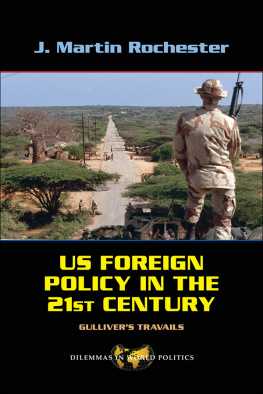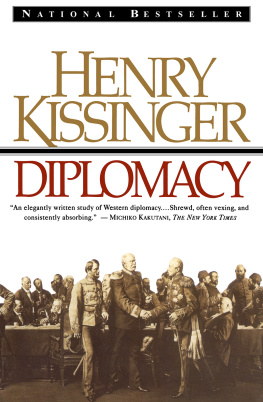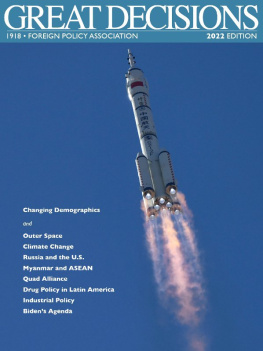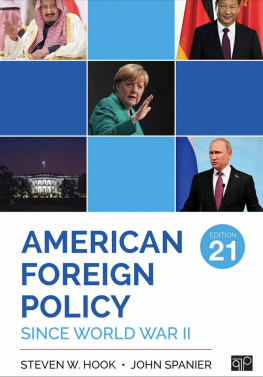US Foreign Policy in the Twenty-First Century
Dilemmas in World Politics
Dilemmas in World Politics offers teachers and students in international relations a series of quality books on critical issues, trends, and regions in international politics. Each text examines a real world dilemma and is structured to cover the historical, theoretical, practical, and projected dimensions of its subject.
BOOKS IN THIS SERIES
US Foreign Policy in the Twenty-First Century: Gullivers Travails
J. Martin Rochester
Democracy and Democratization in a Changing World, Third Edition
Georg Srensen
International Human Rights, Third Edition
Jack Donnelly
The United Nations in the Twenty-first Century, Third Edition
Karen A. Mingst and Margaret P. Karns
Global Environmental Politics, Fourth Edition
Pamela S. Chasek, David L. Downie, and Janet Welsh Brown
Southern Africa in World Politics
Janice Love
Ethnic Conflict in World Politics, Second Edition
Barbara Harff and Ted Robert Gurr
Dilemmas of International Trade, Second Edition
Bruce E. Moon
Humanitarian Challenges and Intervention, Second Edition
Thomas G. Weiss and Cindy Collins
The European Union: Dilemmas of Regional Integration
James A. Caporaso
Global Gender Issues, Second Edition
Spike Peterson and Anne Sisson Runyon
Revolution and Transition in East-Central Europe, Second Edition
David S. Mason
One Land, Two Peoples, Second Edition
Deborah Gerner
Dilemmas of Development Assistance
Sarah J. Tisch and Michael B. Wallace
East Asian Dynamism, Second Edition
Steven Chan
First published 2008 by Westview Press
Published 2018 by Routledge
711 Third Avenue, New York, NY 10017, USA
2 Park Square, Milton Park, Abingdon, Oxon OX14 4RN
Routledge is an imprint of the Taylor & Francis Group, an informa business
Copyright 2008 Taylor & Francis
All rights reserved. No part of this book may be reprinted or reproduced or utilised in any form or by any electronic, mechanical, or other means, now known or hereafter invented, including photocopying and recording, or in any information storage or retrieval system, without permission in writing from the publishers.
Notice:
Product or corporate names may be trademarks or registered trademarks, and are used only for identification and explanation without intent to infringe.
Library of Congress Cataloging-in-Publication Data
Rochester, J. Martin.
US foreign policy in the twenty-first century : Gullivers travails / J. Martin Rochester.
p. cm. (Dilemmas in world politics)
Includes bibliographical references and index.
ISBN-13: 978-0-8133-4369-3
ISBN-10: 0-8133-4369-0
1. United StatesForeign relations21st century. 2. United StatesForeign relations1989 3. United StatesForeign relationsPhilosophy. 4. United StatesForeign relationsDecision makingCase studies. 5. Problem solvingUnited StatesCase studies. I. Title.
E895.R63 2008
327.7300905dc22
2007033385
ISBN 13: 978-0-8133-4369-3 (pbk)
This is a book about U.S. foreign policy. It is easy for a book on American foreign policy to be overtaken by events. As I write, the Iraq War may prove to be either a long-term quagmire that could last into the next decade or a short-lived conflict that, under the pressure of congressional and electoral impatience with an unpopular war, could end rather quickly. However, a premise of this book is that the problems that gave rise to the intervention and the issues raised by the war are symptomatic of much larger, systemic phenomena that are likely to continue to preoccupy American foreign policymakers for much of the early twenty-first century. The war on terror, the proliferation of weapons of mass destruction, the waging of asymmetrical warfare, humanitarian intervention, oil and energy politics, and a litany of other concerns figure to dominate the foreign policy agenda for the foreseeable future. Such matters pose complex dilemmas for which there are no simple answers.
I do not attempt to furnish answers here but to frame the questions in what I hope is a constructive fashion. I aim to engage students in an examination of American foreign policy past, present, and future, involving the reader in critical thinking about how foreign policy is made, what factors affect foreign policy decisions and behavior, and how one might go about not only describing and explaining foreign policy but also evaluating it and prescribing possible solutions. I am particularly interested in exploring the difficult foreign policy choices that confront the United States today in a postCold War environment that is arguably more complicated, if not more dangerous, than the Cold War system that lasted for a half century after World War II.
A central puzzle revolves around the Gulliver metaphor found in this books subtitle. The U.S. position in the world today reminds one of Gullivers Travels, Jonathan Swifts classic eighteenth-century tale of a giant man subdued by a group of tiny people in a strange world. Perhaps never before in history has there been a greater disconnect between potential and performancenever before has an actor seemingly achieved so little with so much going for it, and had its hands tied with so many ostensible advantages. Among the dilemmas the United States is struggling with are the following: (1) How is it possible that the United States has enjoyed a degree of dominance over its nearest rivals not seen since the Roman Empire, yet has failed in so many of its recent foreign policy endeavors, not only in Iraq but throughout the Middle East, East Asia, Latin America, and other regions? (2) How can the United States promote democracy, human rights, and respect for life when it is engaged in a long war against an enemy who may well be planning the next 9/11 attack against the U.S. homeland and does not observe any conventional rules of engagement or any canons of civilized behavior whatsoever? Can the United States, for example, afford to resist the targeting of civilians if terrorists hide behind civilians? (3) How can the United States perform, in the words of some observers, the role of sheriff of the posse when it seems unwilling or unable to mobilize a grand, winning coalition in support of world order? (4) How does the United States offer leadership without appearing to be a domineering bully, that is, without projecting the image of not so much a sheriff but an outlaw, rogue state? (5) How can the United States become more of a multilateral player without potentially jeopardizing its sovereignty and national interests? Assorted schools of thought, including neoconservatives, liberal internationalists, and realists, have offered insights into these kinds of questions, although the answers remain elusive.













